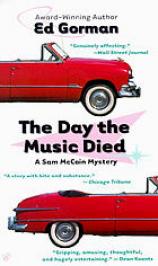The Day the Music Died
Review
The Day the Music Died
If there is a truism with respect to modern detective fiction it is that Ed Gorman is able to pretty much do it all. He is the editor of several highly respected anthologies, he is associated with a number of publishing houses, and he is the author of a number of suspense and mystery novels. Gorman, in the course of his own writing, manages to juggle a number of mystery series, the latest of which feature Sam McCain and are set in Iowa in the late 1950s.
McCain is, by any standard, an interesting piece of work. He is in his early 20s and is an attorney in a small town. It is a truism that while a small town will not support the practice of one attorney, it will support the practices of two. The truth of it, however, is that Black River Falls has more than its fair share of lawyers; McCain must accordingly supplement his income by working as a private investigator for Judge Esme Anne Whitney. Whitney is rich, powerful, and eccentric --- and in the small town politics of Black River Falls, she is the main adversary of Cliff Sykes Jr., the local police chief, whose corruption and ineptitude reach such depths as to be almost laughable. McCain's work for Whitney often brings him into conflict with Sykes and provides some of the major underlying tensions of the series.
THE DAY THE MUSIC DIED is the first of the McCain novels and opens with McCain attending the fateful February 3, 1958 concert of Buddy Holly, Ritchie Valens, and The Big Bopper. McCain is hit the next morning with double bombshells: Holly, Valens, and The Big Bopper have been killed in a plane crash; and McCain stumbles into what is apparently a murder-suicide involving two of the most prominent residents of Black River Falls --- one of whom is the nephew of Judge Whitney. Sykes is happy with the murder-suicide conclusion because it is easy and, more importantly, it is embarrassing to Judge Whitney. McCain, however, is not convinced that the truth is all that neat and tidy and, to Sykes's chagrin and brutal opposition, begins to investigate. Before the day has ended, McCain has discovered a third body, which at first blush appears to be unconnected to the events of the morning. His investigation, however, leads McCain to a conclusion that involves him on a more personal level than he would ever have expected.
Gorman's narration is, as always, first-rate, and right on target. His vignettes involving McCain sitting at the drug store soda fountain reading lurid paperbacks over lunch are absolutely perfect, all the more so for McCain's choice of reading material. While McCain is revealed in dribs and drags to have a varied and well-rounded exposure to literature, his drug store paper back drug of choice is the exploits of...Shell Scott. Scott, gone but not forgotten, was the poor man's Mike Hammer in the 50s. It seemed as if every month a new book with his blond crewcut image, knowing smirk and all, hit the newsstands. His inclusion in THE DAY THE MUSIC DIED is but one of the many touches that Gorman so quietly and effectively drops into the mix to add to the sense of now, '50s style, in his setting. Gorman also deftly adds the complications of small town, heartland race relations and sexual mores into the story as well, giving the reader a fix as to not only where we are in the story, but how, in some ways we have come to be where are at the beginning of the new millennium. My favorite secondary element, however, is that dealing with McCain's personal relationships. McCain has for years been in love with a woman named Pamela Forrest. She in turn, is in love Stu Grant, who is betrothed to someone else --- though this does not prevent him from engaging in an occasional dalliance with Pamela. McCain, however, is not without his own admirer, one Mary Travers, whom McCain wishes he could care for, but somehow can't. This is real, and timeless.
THE DAY THE MUSIC DIED is a low key masterpiece that provides a perfect opening for Gorman's Sam McCain series and will leave readers looking for more. And, while it is not necessary to have lived through the '50s to enjoy this work, those who have will appreciate the lagniappe derived from the details. Very highly recommended.
Reviewed by Joe Hartlaub on April 10, 2000




